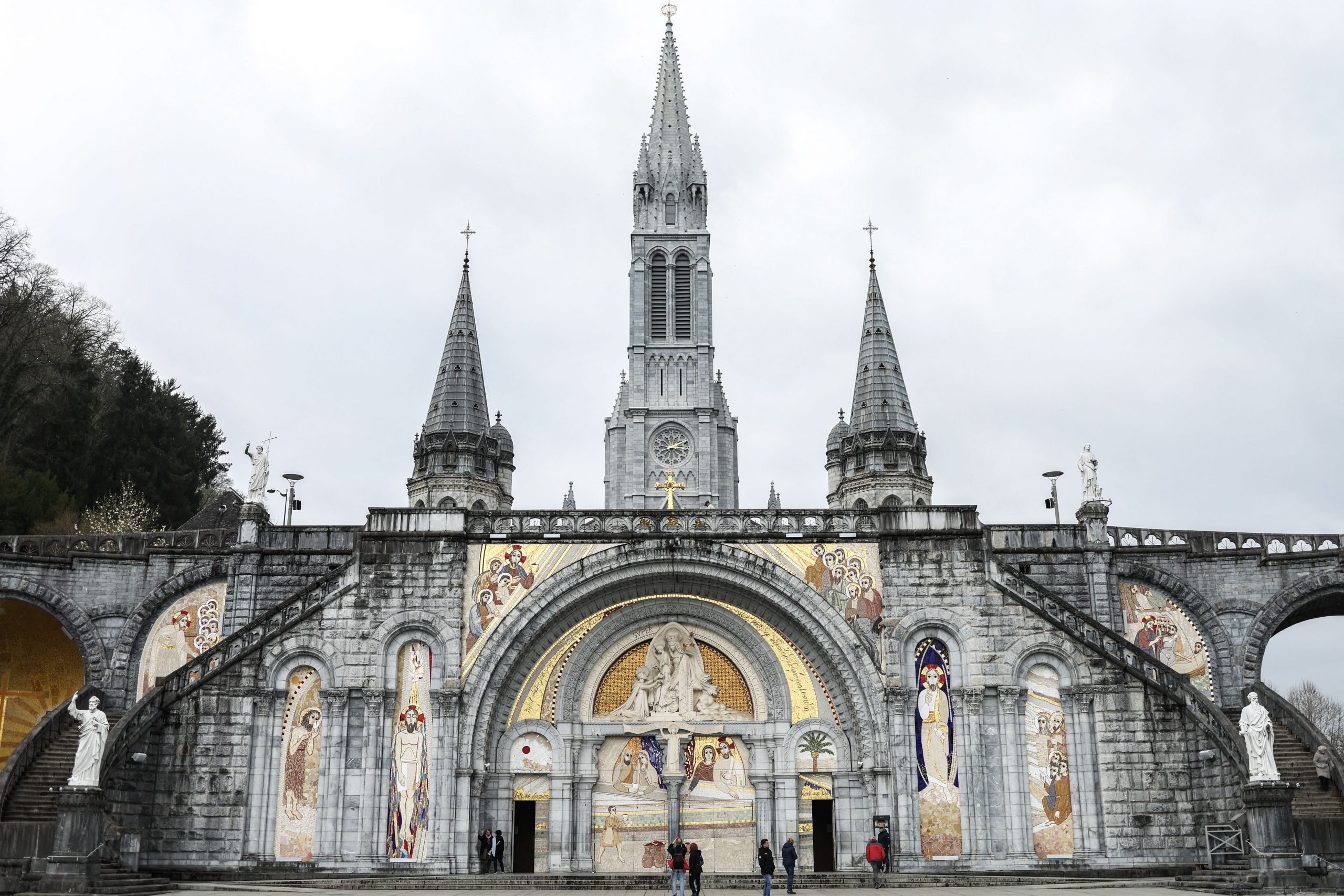
Mosaics by the ex-communicated Jesuit priest and artist Marko Rupnik, who has been accused of sex abuse by at least 30 women, will remain at the Lourdes shrine in France—at least for now—amid calls for their removal. The abuse allegations against the well-known religious artist have previously underscored the limits of the Vatican’s in-house legal system.
Lourdes Bishop Jean-Marc Micas, in an interview with the French Catholic newspaper La Croix, said the works eventually should be removed but he has chosen to leave them in place for now so as not to “tear the church apart.”
Micas was first approached by a woman who had experienced sexual violence in the church in February 2023 and called her testimony “extremely dignified.” In her remarks, she said she had been affected by Rupnik’s mosaics on the façade of the Basilica of Our Lady of the Rosary.
The bishop convened a commission to advise him in making his decision on how to handle the situation, which included a prosecutor, a lawyer specializing in copyright matters, and other church experts on art and sexual assault. The commission concluded in October, agreeing that Rupnik’s actions were “intolerable” but differed in their views of the matter.
Micas said some members of the commission didn’t approve of participating in “cancel culture,” while the other side warned of the public relations risks of being perceived as not taking matters of abuse by clergy seriously if the works remained.
Rupnik’s mosaics are installed in numerous Catholic sites around the world, including the Vatican. There has been a wider debate about what to do with them for more than two years, which has posed challenges for church officials all the way up to Pope Francis, who is also a member of the Jesuit order. Cardinal Sean O’Malley, head of the pope’s Pontifical Commission for the Protection of Minors, has urged Vatican offices to stop displaying Rupnik’s works after Francis ordered an investigation to be reopened and removed the statute of limitations that previously prevented Rupnik from facing a church trial.
Still, some question the necessity of removing the works from their locations, likening them to destroying works by the murderer Caravaggio or the sex tourist Paul Gauguin, a point often made by anti-censorship activists.
Mosaics by artist and priest Marko Rupnik, displayed on the Notre-Dame-du-Rosaire Basilica in the Sanctuary of Lourdes, in Lourdes, France, 2023. Photo: Charly Triballeau/AFP via Getty Images.
“My deep, formed, intimate conviction is that they will one day need to be removed: they prevent Lourdes from reaching all the people for whom the sanctuary’s message is intended,” Micas told La Croix. “But I have decided not to remove them immediately, given the passions and violence the subject incites.”
He added that the lives of the victims and their personhood are “infinitely more valuable” than even the most beautiful work of art and that he would continue to work to convince the church’s constituency that the works should be promptly removed.
The Vatican did not return a request for comment by press time.
Rupnik’s mosaics can also be found at the Saint John Paul II National Shrine in Washington, D.C. Last week, the Knights of Columbus, the Catholic fraternal organization primarily responsible for its management, announced the conclusion of an internal review examining the future of the artist’s mosaics at the Washington shrine and its headquarters in New Haven, Connecticut.
“The Knights of Columbus has decided to cover these mosaics because our first concern must be for victims of sexual abuse, who have already suffered immensely, and who may be further injured by the ongoing display of the mosaics at the Shrine,” said Supreme Knight Patrick Kelly. “This decision is rooted in a foundational purpose of the Knights of Columbus, which is to protect families, especially women and children, and those who are vulnerable and voiceless.”
Father Marko Ivan Rupnik, 2007. Photo: Eric Vandeville/Gamma-Rapho via Getty Images.
Kelly said that shrines are unique places of healing and prayer that should not cause victims further suffering, particularly in the United States where Catholics “continue to suffer in a unique way from the revelations of sexual abuse and, at times, from the response of the Church.”
Details about how and when the works will be covered or removed from view were not provided. It was not clear what would be done with the works when they are removed.
Rupnik was excommunicated by the Vatican in 2019 for absolving a penitent with whom he had engaged in sexual activity; he was reinstated weeks later and continued in his artistic and preaching activities, which included running an art and study center in Rome. Sexual, spiritual, and psychological abuse allegations brought by adult women against the priest continued to surface and Rupnik was expelled by the Jesuits in 2023, although a diocese in his native Slovenia accepted him shortly thereafter. He remains a Catholic priest.
“Why are we more upset about his art that the fact that he is still allowed to hold a chalice?” Rome-based art historian Elizabeth Lev said in comments to the Catholic Herald. She noted that Rupnik was often aided in his murals and questioned whether those assistants should be punished. “Now those people who thought he was God’s gift to art want to dump him? How were they such blind patrons?”